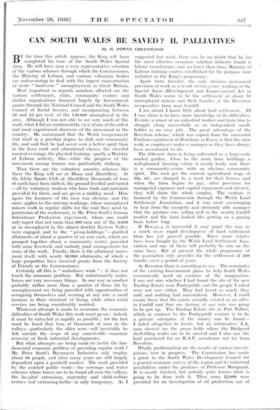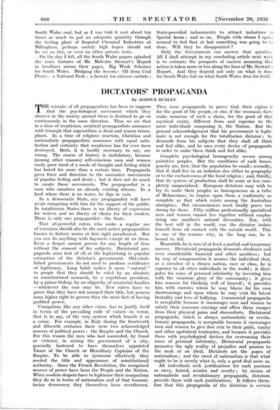CAN SOUTH WALES BE SAVED ? II. PALLIATIVES
By H. POWYS GREENWOOD
BY the time this article appears, the King will have completed his tour of the South Wales Special Area. He will have seen a very representative selection of the various schemes through which the Commissioner, the Ministry of Labour, and various voluntary bodies are endeavouring to deal with the largest concentration of acute " hard-core " unemployment in Great Britain.
Most important as regards numbers affected are the various settlements, clubs, community centres and similar organisations financed largely by Government grants through the National Council and the South Wales Council of Social Service, and incorporating between 20 and 25 per cent. of the 140,000 unemployed in the area. Although I was not able to see very much of this work, what I did see confirmed the view of one of the ablest and most experienced observers of the movement in the country. He maintained that the Welsh temperament lent itself in a peculiar degree to club and community life, and said that he had never seen a better spirit than in the keen craft and educational classes, the cheerful musical evenings, the physical training—partly a Ministry of Labour activity, this—while the progress of the movement among women was particularly striking.
Then there are the voluntary amenity schemes like those the King will see at Dinas and Abertillery. At the Glebe Sports Club at Abertillery thousands of tons of earth have been shifted, the ground levelled and turfed —all by voluntary workers who have tools and materials provided for them, and are given a midday meal. Here again the keenness of the men was obvious, and the same applies to the outcrop workings, where unemployed miners work in regular shifts for the coal they need by permission of the coalowners, to Mr. Peter Scott's famous Subsistence Production experiment, where one could only regret that not more than 300 .men out of the 6,000 or so unemployed in the almost derelict Eastern Valley were engaged, and to the " group-holdings "—glorified allotments of about a quarter of an acre each, which are grouped together about a community centre, provided with some livestock, and embody joint arrangements for some of the work. Finally, there is the allotment move- ment itself, with nearly 30,000 allotments, of which a large proportion have received grants from the Society of Friends or the Commissioner.
Certainly all this is " ambulance work " ; it does not touch the economic problem. But unfortunately ambu- lances are very necessary things. In one way or another probably rather more than a quarter of those hit by Unemployment are being provided with opportunities of occupying themselves and securing at any rate a small increase in their standard of living, while other social services are being considerably assisted.
Whatever attempt is made to overcome the economic difficulties of South Wales this work must go on ; indeed, it must be extended as rapidly as possible ; for the fact must be faced that tens of thousands of men in the valleys—particularly the older men—will inevitably be left outside the scope of any conceivable economic recovery or fresh industrial developments.
But what attempts are being made to tackle the fun- damental economic problem of providing regular work ? Mr. Peter Scott's Brynmawr Industries only employ about 60 people, and after many years are still largely dependent upon a goodwill market. The work provided by the assisted public works—the sewerage and water schemes whose traces are to be found all over the valleys, the hospital extensions, maternity and child-welfare centres and swimming-baths—is only temporary. As I suggested last week, there can be no doubt that by far the most effective economic solution hitherto found is labour transference, and no fewer than three Ministry of Labour training centres established for the purpose were included in the King's programme.
Apart from transfer, the only obvious permanent provision of work as a result of two years' working of the Special Areas (Development and Improvement) Act in South Wales seems to be the settlement of about 70 unemployed miners and their families at the Boverton co-operative farm near Cardiff.
I am afraid I know little about land settlement. All I can claim is to have some knowledge of its difficulties.
To take a miner or an industrial worker and train him to struggle along successfully as an independent small- holder is no easy job. The great advantage of the Boverton scheme, which was copied from the successful Fordson experiment at Boreham, in Essex, is that the men work as employees under a manager as they have always been accustomed to do.
The 650-acre farm is being cultivated as a large-scale market garden. Close to the main farm buildings a well-planned housing estate is nearly ready and there is a community-centre with an obvious community spirit. The men get the current agricultural wage of 33s. 6d., are charged 4s. a week for their houses, and when the farm begins to pay, after provision for managerial expenses and capital repayment and interest, they will share the whole surplus. The venture is financed by the Commission through the Welsh Land Settlement Association, and it was most encouraging to hear from the energetic and obviously able manager that the produce was selling well in the nearby Cardiff market and the farm looked like getting on a paYing basis before long.
If Bovtrun is successful it may point the way to a much more rapid development of land settlement than has yet proved possible. Three more estates have been bought by the Welsh Land Settlement Asso- ciation and one of them will probably be run on the same lines. But at present the whole programme of the association only provides for the settlement of 500 families over a period of years.
At Boverton there is something to see. The remainder of the existing Government plans to help South Wales economically need an exercise of the imagination.
I was not sure whether I had found the site of the new Trading Estate near Pontypridd, and the people I asked were not sure either. They had heard so much, they said, and nothing had materialised. However, I could assure them that the estate actually existed as an office in Cardiff and that one factory at any rate was going to be put up. The Trading Estate site at Port Talbot, which in contrast to the Pontypridd venture is to be a private enterprise—if the money can be found— I failed altogether to locate, but an informative A.A. man showed me the green fields where the Bridgend shell-filling works arc to be erected and I also saw the land purchased for an R.A.F. aerodrome not far from Boverton.
Wholly problematical are the results of various investi- gations now in progress. The Commission has made a grant to the South Wales Development Council for a general economic survey of the region and its industrial possibilities under the guidance of Professor Marquand., It is nearly finished, but nobody quite knows what is going to be done with it. Then some £2,000 were proVided for an investigation of oil production out of South Wales coal, but as I was told it cost about ten times as much to put an adequate quantity through the testing plant of Imperial Chemical Industries at Billingham, perhaps unduly high hopes should not be set on this, or even on other private tests.
On the day I left, all the South Wales papers splashed the main features of Mr. Malcolm Stewart's Report in headlines across their pages. Big Work Schemes for South Wales. Bridging the Severn : Oil from Coal Plants : a National Park : a factory for calcium carbide : State-provided inducements to attract industries to Special Areas : and so on. People with whom I spoke seemed to feel that at last something was going to be done. Will they be disappointed ?
Only the Government can answer that question. All I shall attempt in my concluding article next week is to estimate the prospects of success assuming that action is taken more or less along the lines of Mr. Stewart's Report. And they depend not only on what is done for South Wales but on what South Wales does for itself.





























































 Previous page
Previous page